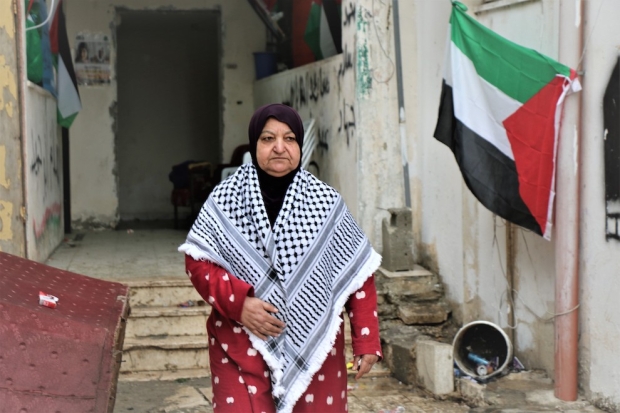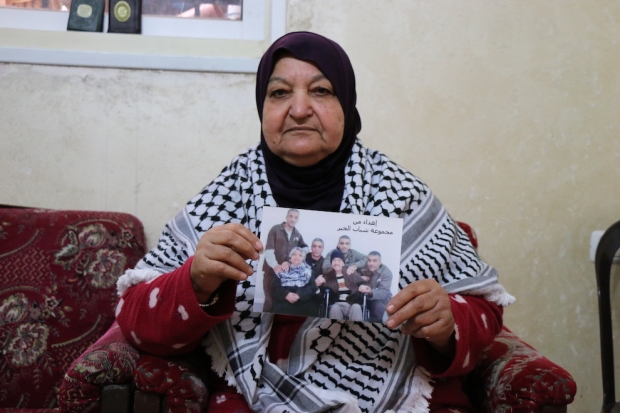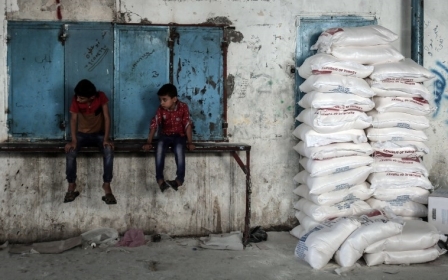In night-long raid, Israel demolishes home of alleged Palestinian attacker
Al-Amari Refugee Camp, Occupied West Bank - The first large explosion went off at 6am in al-Amari refugee camp. The second at 8:30am, levelling the home of Umm Naser Abu Hmeid on Saturday morning.
Before and afterwards, the smaller explosions of stun grenades dominated the night as hundreds of Israeli soldiers raided the camp in retaliation for the killing of an Israeli soldier in May, when he was hit by an 18-kilogram marble slab allegedly slung from a roof by Umm Nasser's son Islam.
“They besieged the entire camp, and completely surrounded the Abu Hmeid home,” Majdi Emeimi, 52, a member of al-Amari’s local council, told Middle East Eye.
Witnesses said up to 700 soldiers arrived in the Amari camp early on Saturday, clearing the family's four-storey home of its residents and activists who had camped out to stop the demolition - barricading the home and signing Palestinian chants in defiance - then evacuating neighbours into the cold of the night.
“They didn’t let people put proper warm clothes on or take food for their children, they just made everyone leave without even closing the doors to their homes,” said Ememi.
“They took the elderly, children, women, everyone in the area, and put them inside the cold school.”
He also claimed the Palestinian Red Crescent ambulances were stopped at least three times by Israeli soldiers when trying to evacuate the woman.
The Israelis withdrew by 9:45am but had been clashing with local youth right up until that point.
A hasty demolition
The operation followed a frantic few days when the Israeli army has repeatedly raided Ramallah in search of an attacker who killed two Israeli soldiers on Thursday.
Five Palestinians have been killed since Wednesday and more than 70 were arrested during raids across the West Bank, while Ramallah was at one point declared a closed military zone, the army confirmed without specifying when or for how long the restriction was in place.
Israeli Prime Minister Benjamin Netanyahu announced on Thursday that in response to the latest spate of “terror attacks,” he would be fast-tracking the punitive demolitions of the homes of Palestinians accused of carrying out attacks on Israelis.
According to Umm Nasser, who spoke to MEE two days before the demolition of her home, the Israelis first delivered a demolition notice to her in September, three months after her son allegedly killed the Israeli soldier.
“The initial demolition notice was just for the first floor of the building, but then a week later they came and said they would be destroying the whole building,” she said.
Umm Nasser’s lawyers appealed the decision on the basis that her son had not yet been convicted of killing the soldier and that demolishing the entire building would cause disproportionate harm to the other occupants who were not involved in the attack, amounting to collective punishment.
The family also argued the Israeli army only moved to demolish the entire building after pressure from the family of the deceased soldier.
Last week, the court rejected Umm Nasser’s appeal. Despite acknowledging that destroying the entire building would unfairly harm some residents, the court allowed it to go ahead as a “deterrence” against future attacks.
Despite the Israeli government's insistence that punitive home demolitions - which it has been carrying out for decades - act as a deterrent of future attacks, the state has never presented any figures to prove their claims.
In 2005, an Israeli military committee even argued that the practice did not deter attacks, instead sowing resentment.
Israeli rights group B’Tselem has condemned the practice as “court-sanctioned revenge,” saying it amounts to collective punishment, which is prohibited under international law.
‘We’ve been through it all before’
Umm Nasser is the mother of 12 children, 10 boys and two girls. Six of her sons, including Islam, are currently in Israeli prison, with four of them serving multiple life sentences. Another of her sons was killed by Israeli forces in 1994.
“They grew up in these crowded streets, they witnessed the terror of the occupation from a young age,” she told MEE, noting that several of her sons came of age during the First Intifada, the uprising against Israeli occupation that began in 1987.
All of her four sons serving life sentences were convicted of killing Israeli soldiers then or during the Second Intifada of the early 2000s.
“I have been visiting Israeli jails for 35 years. There isn’t a prison that I have not visited,” she told MEE, adding that since Islam’s arrest in July, she along with other family members have been banned from visiting her sons in jail.
“People may call them terrorists, but I am proud of them for defending their country,” she said. “The Israelis are the terrorists who have invaded and occupied our land. My sons, and everyone in Palestine has the right to resist their oppressors.”
During the 1980s, Umm Nasser said the Israelis raided her home when she was eight months pregnant. “They pushed me and kicked me on my stomach as my other children watched,” she said, adding that a few days later she had a miscarriage.
Their home has been demolished twice before, in 1991 and 2003.
“There isn’t a home in Palestine that hasn’t been affected in some way by the occupation,” she said.
“My family has been through everything with the Israeli occupation, and we will get through this as well.”
New MEE newsletter: Jerusalem Dispatch
Sign up to get the latest insights and analysis on Israel-Palestine, alongside Turkey Unpacked and other MEE newsletters
Middle East Eye delivers independent and unrivalled coverage and analysis of the Middle East, North Africa and beyond. To learn more about republishing this content and the associated fees, please fill out this form. More about MEE can be found here.





